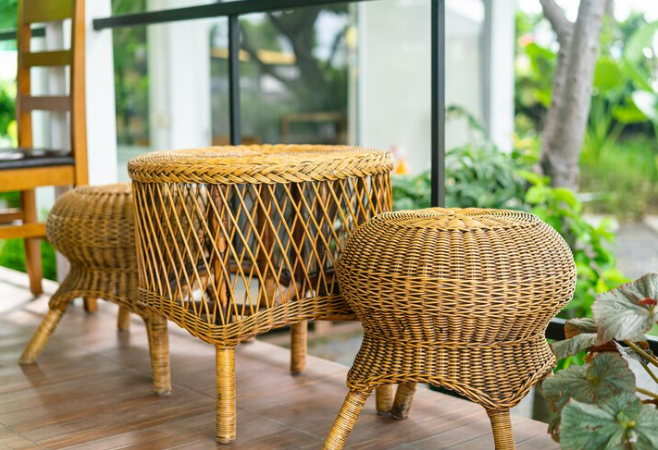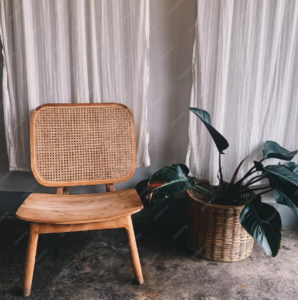
Rattan Furniture Industry in Bali
Table of Contents
Visa4Bali.com – Rattan Furniture Industry in Bali
Bali, known for its artisanal spirit and timeless craftsmanship, has become a hub for the rattan furniture industry. In this blog post, let’s dive into the intricate world of rattan furniture in Bali, exploring its cultural significance, economic impact, and the sustainable practices that make it a shining example of the island’s commitment to environmental consciousness.
The Artistry of Rattan

Rattan weaving is deeply ingrained in Bali’s cultural heritage, dating back centuries. The artisans, often following traditions passed down through generations, transform humble rattan vines into exquisite pieces of furniture. The artistry goes beyond functionality; each piece tells a story, capturing the essence of Bali’s rich cultural tapestry.
Rattan furniture is not merely an industry in Bali; it’s a cultural expression. From intricate patterns to symbolic designs, these pieces often reflect the spiritual and natural elements that define Balinese life. The commitment to preserving traditional techniques ensures that every rattan creation is a celebration of the island’s artistic legacy.
The rattan industry in Bali has embraced sustainable practices, acknowledging the importance of preserving the environment. The use of locally sourced rattan vines, which grow abundantly in the region, reduces the carbon footprint associated with transportation. Additionally, the eco-friendly nature of rattan makes it a renewable resource, aligning with Bali’s commitment to responsible production.
Impact on Bali’s Economy
Beyond its cultural significance, the rattan furniture industry plays a pivotal role in Bali’s economic landscape. The growth of this industry has led to a myriad of positive impacts, contributing to employment, tourism, and the overall economic well-being of the island.
Employment Opportunities
The demand for skilled artisans in the rattan industry has created employment opportunities for local communities. Families often work together, passing on their expertise and contributing to the sustainability of traditional craftsmanship.
Tourism Magnet
Bali’s rattan furniture has become a draw for tourists seeking unique, handcrafted souvenirs. Rattan workshops and showrooms offer visitors an immersive experience, allowing them to witness the artistry firsthand and take home a piece of Bali’s craftsmanship.
Global Market Presence
Bali’s rattan furniture has found a place in the global market, gaining recognition for its quality and unique designs. This global reach not only boosts the island’s economy but also establishes Bali as a key player in the international furniture industry.
Challenges in the Weave Balancing Tradition and Modernity

While the rattan furniture industry in Bali thrives, it faces its set of challenges in navigating the delicate balance between preserving tradition and embracing modernity.
Market Trends
Keeping up with evolving market trends and consumer preferences poses a challenge. Balinese artisans must find ways to integrate contemporary elements without compromising the authenticity and cultural richness of their creations.
Environmental Concerns
As the demand for rattan furniture grows, concerns about overharvesting and environmental impact arise. Bali’s commitment to sustainability is tested, requiring a delicate approach to ensure the balance between economic prosperity and environmental responsibility.
Sustainable Innovation in Rattan

As the rattan furniture industry in Bali continues to evolve, there is a promising future shaped by sustainable innovation. Balinese artisans and entrepreneurs are exploring ways to blend tradition with modernity, creating a harmonious weave that ensures the longevity of this culturally significant industry.
Innovative Designs
The industry is witnessing a surge in innovative designs that cater to diverse tastes while maintaining the authenticity of Balinese craftsmanship. Collaborations between local artisans and international designers contribute to a fusion of styles that appeals to a global audience.
Environmental Initiatives
To address environmental concerns, the industry is actively exploring eco-friendly practices. Initiatives such as reforestation projects and responsible harvesting practices aim to ensure the sustainability of rattan as a resource for generations to come.
Bali’s rattan furniture industry is a testament to the island’s ability to seamlessly blend tradition, artistry, and economic growth. As visitors, appreciating the story behind each piece of rattan furniture adds a layer of depth to the experience, connecting us to the cultural and economic tapestry that makes Bali a truly remarkable destination.
The Best Visa Agency in Bali – www.visa4bali.com
Experienced specialists managing the entire application process from start to finish !





